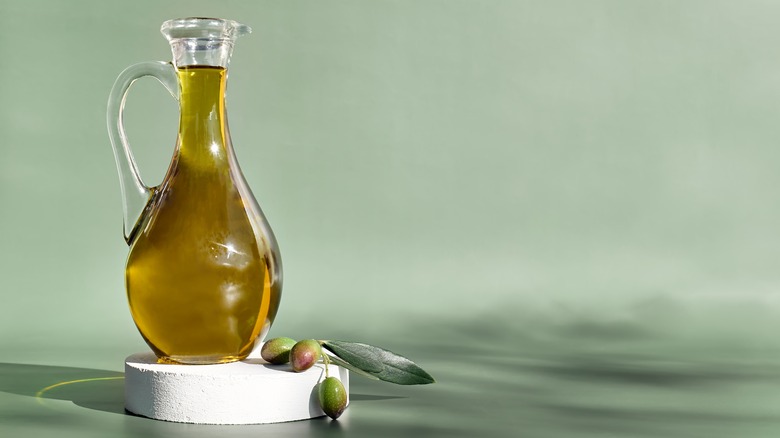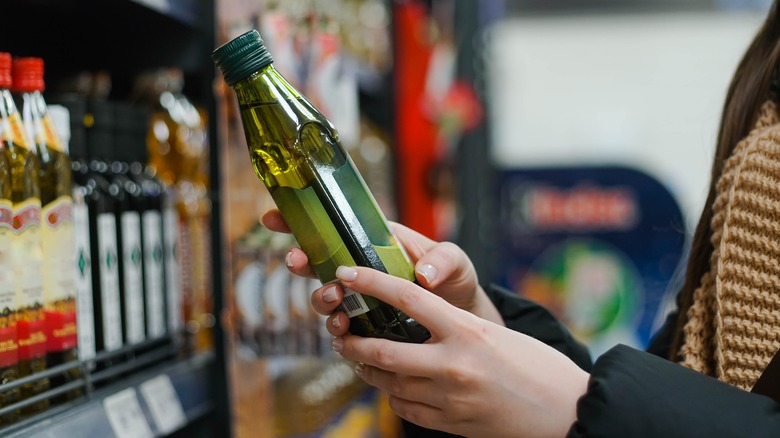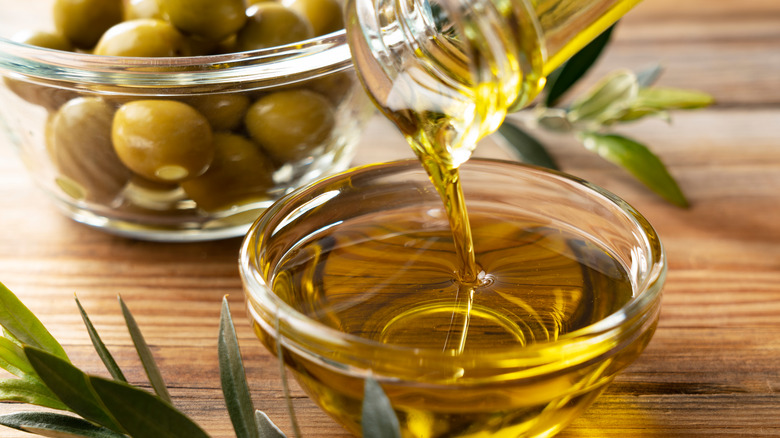Why You Should Avoid Buying Olive Oil In A Clear Bottle
Olive oil is one of those things that every cook should have in their pantry. Although it is best known as the foundation of the Mediterranean diet, this liquid gold can elevate a wide array of cuisines, being more nutritious and flavorful than other cooking oils. However, olive oil is also subject to vast discrepancies in quality. A truly great olive oil should have a robust flavor, balancing fresh fruitiness with the gentle bitterness of ripe olives and a peppery kick that tickles the back of your throat (if you're bold enough to drink some straight). Finding all these traits is frustratingly rare. While you can find some quality assurance in purchasing extra-virgin olive oil, even that doesn't guarantee a good product.
Olive oil is rather finicky. It's prone to spoilage unless the manufacturing process and storage are done under the proper conditions. Failure to do so can change the taste of the oil in a variety of undesirable ways. If the olives are exposed to excess humidity, the oil can become musty, taking on a moldy or mildewy essence. If the fruit is allowed to ferment, the oil can develop a vinegary flavor. But the most common form of olive oil spoilage is rancidity. You know what rancid tastes like if you've ever eaten stale crackers or old nuts — and it's not pleasant at all. The easiest way to ensure that you don't end up with rancid olive oil is simple: never buy it in a clear bottle.
Dark bottles keep olive oil fresh
Keeping olive oil in a clear bottle exposes it to more light, which will turn it rancid faster. In the simplest terms, rancidity occurs when fats and oils decompose. But to really understand the impact that light can have on olive oil, we need to get into some more detailed chemistry. Olive oil is an unsaturated fat, which (when exposed to light, heat, or oxygen) undergoes a chemical reaction called lipid oxidation. In lipid oxidation, fatty acids react with oxygen molecules and gradually degrade into compounds known as aldehydes and ketones. These compounds are responsible for the unpleasant flavor and odor we associate with rancid foods.
In order to prevent rancidity, fatty and oily foods need to be protected from oxygen, heat, and light, particularly ultraviolet light from the sun. This is why the type of bottle you buy olive oil in is so important. Clear bottles let UV light come flooding in, speeding up the rancidification process. On the other hand, dark bottles, ceramic vessels, and metal cans allow less light to penetrate and trigger oxidation. But the oxidation process has effects that reach well beyond taste and smell. It can actually lessen the nutritional value of your olive oil.
Olive oil in clear bottles is less nutritious
Olive oil is cherished as a healthy type of fat to cook with, and a huge part of its value is due to its high antioxidant levels. Antioxidants work to protect us from the damaging effects of free radicals, a group of molecules that are highly unstable because they are missing an electron. In an effort to stabilize themselves, free radicals can pick up electrons from the cells in our bodies. This is a direct cause of a number of diseases, as well as the aging process overall. Free radicals are the natural byproduct of metabolism, so they are impossible to avoid altogether, but antioxidants can combat some of the damage. Antioxidants are also unstable — but instead of stealing electrons from the cells of our body, they steal the lone electrons of free radicals.
When olive oil oxidizes, it loses a significant amount of its antioxidant content, particularly in the form of tocopherols, which are varying forms of vitamin E. Olive oil that has been exposed to light through a clear bottle will be lower in vitamin E than olive oil that has been protected from the light. Worse still, rancidity actually causes free radicals to form within the olive oil itself, introducing a higher number of them to your body. So — for the sake of both flavor and health — it is essential to buy olive oil in a dark or opaque bottle and store it in a cool, dark place.


